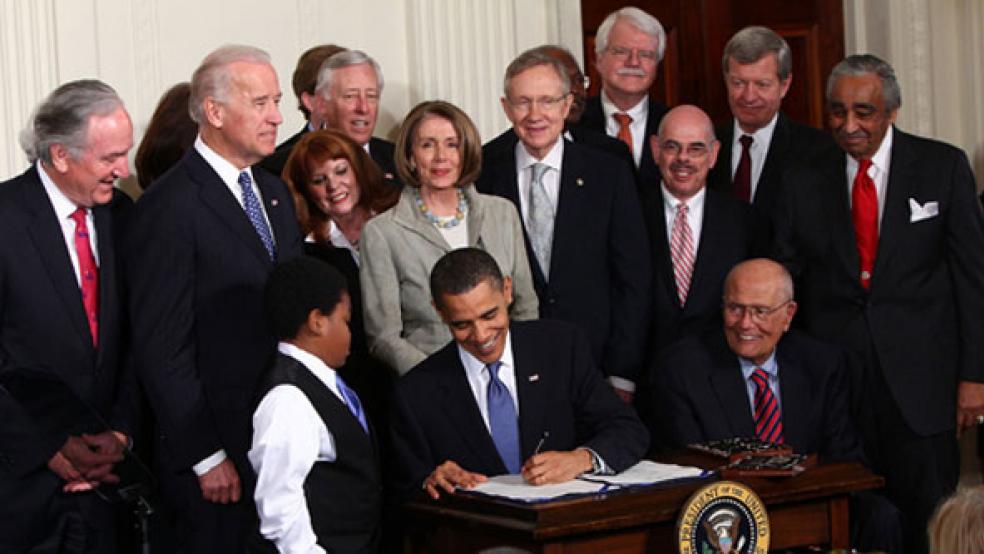President Obama today signed landmark legislation designed to alter the contours of the U.S. health care system and eventually extend coverage to 32 million uninsured Americans.
The signing ceremony in the White House East Room capped a year-long battle over health care reform that sorely divided the Congress and the country along political and ideological lines and forced the Democrats to pass the final version of the legislation in the Senate and House without a single Republican vote.
"Today, after almost a century of trying; today, after over a year of debate; today, after all the votes have been tallied, health insurance reform becomes law in the United States of America," Obama said. "In a few moments, when I sign this bill, all of the overheated rhetoric over reform will finally confront the reality of reform."
While the health care controversy is far from settled – and is certain to become a decisive issue as the Democrats struggle to retain control of Congress in the November midterm election – Obama and the Democrats enjoyed a rare opportunity for joyous celebration at the White House. Obama will continue to make his case for health care reform to the country, beginning with a trip to Iowa this Thursday, according to White House officials.
Obama and Vice President Biden were greeted by a cheering crowd of Democratic lawmakers, White House officials, health care advocates, labor leaders and others who applauded and chanted, "Way to go." House Speaker Nancy Pelosi, D-Calif., and Senate Majority Leader Harry Reid, D-Nev., Obama’s key allies on Capitol Hill, took part in the ceremony, as did scores of committee chairpersons and other Hill leaders who helped guide the legislation to passage. Obama acknowledged that many Democratic leaders "took their lumps" during the bitter political debate over health care reform. Someone in the crowd responded, "Yes, we did!"
Also present was Victoria Reggie Kennedy, the widow of the late Sen. Edward M. Kennedy, D-Mass., a major champion of health care reform for decades. Biden told Obama that while other leaders tried to pass major health care legislation to insure that most Americans had access to good health care, "Mr. President, you’re the guy who made it happen."
Once the speeches were over, Obama sat at a ceremonial desk at 11:55 a.m. and signed the legislation, using 20 different pens that were later presented to lawmakers and others who were instrumental in passing the legislation.
The House on Sunday night voted 219 to 212 to send the ten-year, $938 billion bill to the president for his signature. The legislation, which the Senate approved last Christmas Eve, will give most Americans the opportunity to purchase health insurance and will ban a number of anti-consumer insurance company practices, such as denying coverage to people with existing medical problems.
A companion "reconciliation" measure also approved by the House on Sunday night makes a number of changes to the underlying legislation that were essential to winning majority support among House Democrats. That measure awaits final approval by the Senate this week.
Republican leaders have denounced the health care legislation as too costly, a threat to the economy and a dangerous move toward government-controlled medicine. They have vowed to try to defeat or sidetrack the reconciliation bill this week. They have also launched a nationwide campaign to repeal the legislation, challenge its constitutionality and block its implementation at the state level.
The legislation will take effect in stages. By the end of September, for example, insurers will be required to keep young adults as beneficiaries on their parents' health plans until they turn 26, and companies will no longer be allowed to deny coverage to sick children. Other changes will not take effect until 2014.
By then, most Americans will for the first time be required to carry health insurance — either through an employer, through a government program or by buying it for themselves. Individuals who decline to acquire insurance will face penalties from the IRS. Tax credits to help pay for premiums will start flowing to middle-class working families with incomes of up to $88,000 a year, and Medicaid will be expanded to cover more low-income people.




